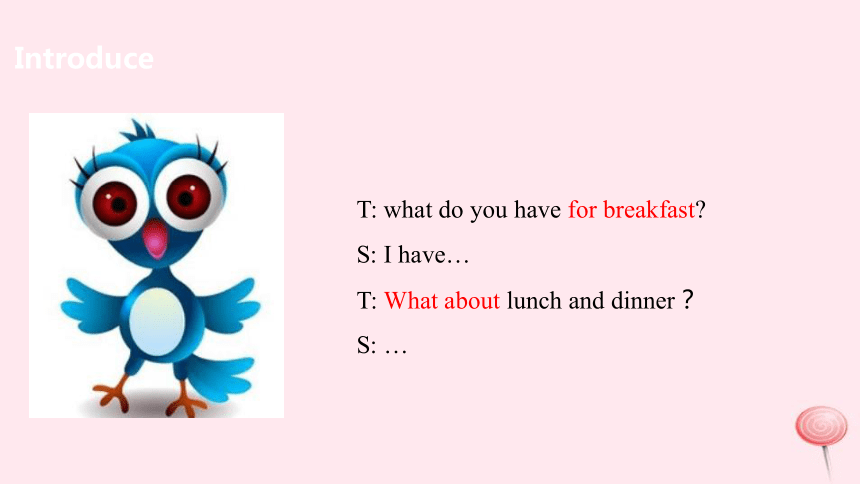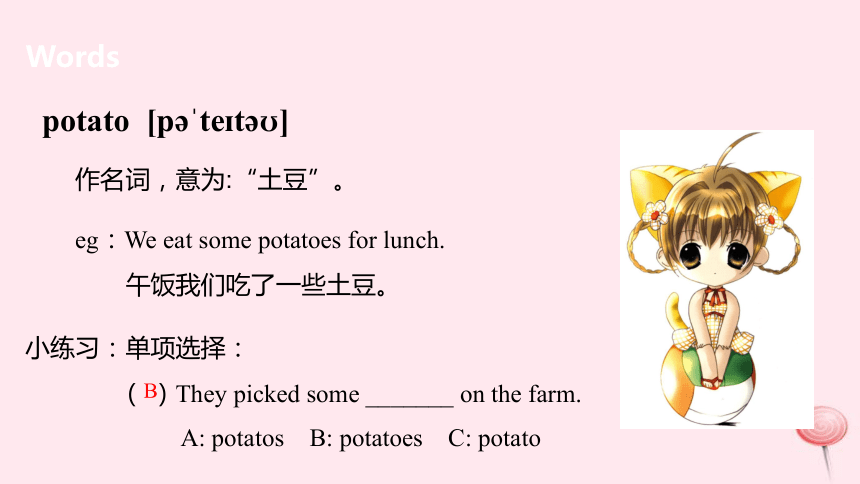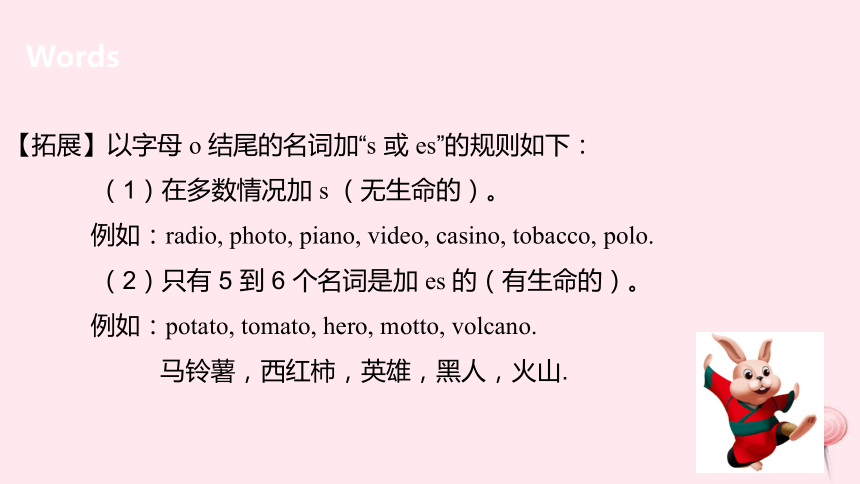Unit 3 A healthy diet 课件(共17张PPT)
文档属性
| 名称 | Unit 3 A healthy diet 课件(共17张PPT) |  | |
| 格式 | zip | ||
| 文件大小 | 2.3MB | ||
| 资源类型 | 教案 | ||
| 版本资源 | 牛津译林版 | ||
| 科目 | 英语 | ||
| 更新时间 | 2019-08-16 08:35:10 | ||
图片预览







文档简介
(共17张PPT)
Unit 3
A healthy diet.
Introduce
T: what do you have for breakfast?
S: I have…
T: What about lunch and dinner?
S: …
Words
eat [i:t]
作动词,意为:“吃”。
eg:I eat an egg in the morning.
早上我吃了一个鸡蛋。
小练习:汉译英:吃一些面条 ____________
eat some noodles
拓展:have 是用餐和吃饭,强调整个吃饭的笼统过程,多用于短语中。
eat 很多时候,强调吃这个动作,就是强调把东西放进嘴。
Words
potato [p??te?t??]
作名词,意为:“土豆”。
eg:We eat some potatoes for lunch.
午饭我们吃了一些土豆。
小练习:单项选择:
( )They picked some _______ on the farm.
A: potatos B: potatoes C: potato
B
Words
tomato [t??mɑ:t??]
作名词,意为:“西红柿”。
eg:Today he eats a lot of tomatoes.
今天他吃了一些西红柿。
小练习:单项选择:
( )They ate some _______ .
A: tomatos B: tomatoes C: tomato
B
Words
【拓展】以字母 o 结尾的名词加“s 或 es”的规则如下:
(1)在多数情况加 s (无生命的)。
例如:radio, photo, piano, video, casino, tobacco, polo.
(2)只有 5 到 6 个名词是加 es 的(有生命的)。
例如:potato, tomato, hero, motto, volcano.
马铃薯,西红柿,英雄,黑人,火山.
Expressions
We eat a lot of noodles. 我们吃了一些面条。
本句中有一个知识点a lot of 后面既可以接可数名词,也可以接不可数名词,如果接的是可数名词一定要变成复数形式。
eg:There are a lot of people in the street.
街上有许多人。
小练习:汉译英:
许多人____________
a lot of people
【拓展】 a lot of与many
a lot of与many都含有“许多”的意思,后可以接可数名词复数,用于肯定句时可以互换使用。
a lot of与lots of同义,其后可以接可数名词复数或不可数名词,而many之后只能接可数名词复数。?
两者后接可数名词复数时a lot of 通常用于肯定句,而many可用于各种句式。
例如:(1) I have a lot of / many friends here.?在这里我有许多朋友。
(2) Here is a lot of / lots of snow this year. 今年雪下得多。
(3)I have a lot of comic books.我有许多漫画书。
Expressions
Expressions
He eats a few eggs.
他吃了一些鸡蛋。
本句中有一个知识点:a few表示:“有一点”,不过只可以修饰可数名词,后面的名词应该用复数形式。
eg:They have a few books in the school.
他们书包里有一点书。
小练习:汉译英:
有一点____________
a few
Expressions
What about lunch and dinner?
那午饭和晚饭呢?
本句中有一个知识点,what about的用法,表示:“…怎么样?”,后面如果接动词,应该接动词的ing形式。
eg:What about going for a walk?
出去散步怎么样?
小练习:用所给词的适当形式填空:
What about _____(drink)some tea ?
drinking
【拓展】(1)询问情况或打听消息。对方谈的事情不明确,需要询问清楚,也可用此句型。?
??? 例如:①?I'd?like?a?cup?of?tea.?What?about?you??我想喝杯茶,你呢??????
②—I?want?to?talk?to?you.?我要和你谈话。—What?about?谈什么??
???? (2)向对方提出建议或请求,相当于句型Would?you?like...??语气很委婉。
??? ? 例如:What?about?having?some?bread?=Would?you?like?some?bread??吃些面包吗?
?? (3)寒暄时用作承接上下文的转折语。
?例如:I'm?a?student.?What?about?you??我是学生,你呢??
? (4)询问天气或身体等状况。如:?
?? ??例如:What?about?the?weather?in?your?city??你们城市的天气情况如何??
Expressions
Dialogue
We eat a lot of noodles.
我们吃了一些面条。
They have some vegetables.
他们吃了一些蔬菜。
He eats a few eggs.
他吃了一些鸡蛋。
She drinks a little water.
她喝了一点水。
A: What do you have for breakfast?
你早饭吃了什么?
B: I have some noodles.
我吃了一些面条。
A: What about lunch and dinner?
那午饭和晚饭呢?
B: For lunch and dinner, I have a lot of rice, some meat and some vegetables.
午饭和晚饭,我吃了米饭,一些肉和一些蔬菜。
Mary has some noodles for breakfast.
Mary早饭吃了一些面条。
She has a lot of rice, some meat and some vegetables for lunch and dinner.
她吃了一些米饭,一些肉和一些蔬菜作为午饭和晚饭。
Dialogue
Summary
eat
potato
tomato
We eat a lot of noodles.
He eats a few eggs.
Exercise
连词成句
1. a, eats, he, few, eggs(.)
________________________________________
2. have, you, what, do, lunch, for(?)
___________________________________________
3. lunch, about, dinner, what, and(?)
_____________________________________________
4. noodles, for, Mary, some, has, dinner(.)
____________________________________________
5. also, he, a, eats, bread, little(.)
_______________________________________________
He eats a few eggs.
What do you have for lunch?
What about lunch and dinner?
Mary has some noodles for dinner.
He also eats a little bread.
Exercise
用所给词的适当形式填空
1. Please don’t make noise. The boy _________ (sleep).
2. Please________ (not walk) on the grass.
3. What about ________________(play) football?
4. There is a lot of ________(rain) in winter.
5. How many _______(tomato) are there in the fridge?
is sleeping
don’t walk
playing
rain
tomatoes
Homework
Know the healthy diet
Unit 3
A healthy diet.
Introduce
T: what do you have for breakfast?
S: I have…
T: What about lunch and dinner?
S: …
Words
eat [i:t]
作动词,意为:“吃”。
eg:I eat an egg in the morning.
早上我吃了一个鸡蛋。
小练习:汉译英:吃一些面条 ____________
eat some noodles
拓展:have 是用餐和吃饭,强调整个吃饭的笼统过程,多用于短语中。
eat 很多时候,强调吃这个动作,就是强调把东西放进嘴。
Words
potato [p??te?t??]
作名词,意为:“土豆”。
eg:We eat some potatoes for lunch.
午饭我们吃了一些土豆。
小练习:单项选择:
( )They picked some _______ on the farm.
A: potatos B: potatoes C: potato
B
Words
tomato [t??mɑ:t??]
作名词,意为:“西红柿”。
eg:Today he eats a lot of tomatoes.
今天他吃了一些西红柿。
小练习:单项选择:
( )They ate some _______ .
A: tomatos B: tomatoes C: tomato
B
Words
【拓展】以字母 o 结尾的名词加“s 或 es”的规则如下:
(1)在多数情况加 s (无生命的)。
例如:radio, photo, piano, video, casino, tobacco, polo.
(2)只有 5 到 6 个名词是加 es 的(有生命的)。
例如:potato, tomato, hero, motto, volcano.
马铃薯,西红柿,英雄,黑人,火山.
Expressions
We eat a lot of noodles. 我们吃了一些面条。
本句中有一个知识点a lot of 后面既可以接可数名词,也可以接不可数名词,如果接的是可数名词一定要变成复数形式。
eg:There are a lot of people in the street.
街上有许多人。
小练习:汉译英:
许多人____________
a lot of people
【拓展】 a lot of与many
a lot of与many都含有“许多”的意思,后可以接可数名词复数,用于肯定句时可以互换使用。
a lot of与lots of同义,其后可以接可数名词复数或不可数名词,而many之后只能接可数名词复数。?
两者后接可数名词复数时a lot of 通常用于肯定句,而many可用于各种句式。
例如:(1) I have a lot of / many friends here.?在这里我有许多朋友。
(2) Here is a lot of / lots of snow this year. 今年雪下得多。
(3)I have a lot of comic books.我有许多漫画书。
Expressions
Expressions
He eats a few eggs.
他吃了一些鸡蛋。
本句中有一个知识点:a few表示:“有一点”,不过只可以修饰可数名词,后面的名词应该用复数形式。
eg:They have a few books in the school.
他们书包里有一点书。
小练习:汉译英:
有一点____________
a few
Expressions
What about lunch and dinner?
那午饭和晚饭呢?
本句中有一个知识点,what about的用法,表示:“…怎么样?”,后面如果接动词,应该接动词的ing形式。
eg:What about going for a walk?
出去散步怎么样?
小练习:用所给词的适当形式填空:
What about _____(drink)some tea ?
drinking
【拓展】(1)询问情况或打听消息。对方谈的事情不明确,需要询问清楚,也可用此句型。?
??? 例如:①?I'd?like?a?cup?of?tea.?What?about?you??我想喝杯茶,你呢??????
②—I?want?to?talk?to?you.?我要和你谈话。—What?about?谈什么??
???? (2)向对方提出建议或请求,相当于句型Would?you?like...??语气很委婉。
??? ? 例如:What?about?having?some?bread?=Would?you?like?some?bread??吃些面包吗?
?? (3)寒暄时用作承接上下文的转折语。
?例如:I'm?a?student.?What?about?you??我是学生,你呢??
? (4)询问天气或身体等状况。如:?
?? ??例如:What?about?the?weather?in?your?city??你们城市的天气情况如何??
Expressions
Dialogue
We eat a lot of noodles.
我们吃了一些面条。
They have some vegetables.
他们吃了一些蔬菜。
He eats a few eggs.
他吃了一些鸡蛋。
She drinks a little water.
她喝了一点水。
A: What do you have for breakfast?
你早饭吃了什么?
B: I have some noodles.
我吃了一些面条。
A: What about lunch and dinner?
那午饭和晚饭呢?
B: For lunch and dinner, I have a lot of rice, some meat and some vegetables.
午饭和晚饭,我吃了米饭,一些肉和一些蔬菜。
Mary has some noodles for breakfast.
Mary早饭吃了一些面条。
She has a lot of rice, some meat and some vegetables for lunch and dinner.
她吃了一些米饭,一些肉和一些蔬菜作为午饭和晚饭。
Dialogue
Summary
eat
potato
tomato
We eat a lot of noodles.
He eats a few eggs.
Exercise
连词成句
1. a, eats, he, few, eggs(.)
________________________________________
2. have, you, what, do, lunch, for(?)
___________________________________________
3. lunch, about, dinner, what, and(?)
_____________________________________________
4. noodles, for, Mary, some, has, dinner(.)
____________________________________________
5. also, he, a, eats, bread, little(.)
_______________________________________________
He eats a few eggs.
What do you have for lunch?
What about lunch and dinner?
Mary has some noodles for dinner.
He also eats a little bread.
Exercise
用所给词的适当形式填空
1. Please don’t make noise. The boy _________ (sleep).
2. Please________ (not walk) on the grass.
3. What about ________________(play) football?
4. There is a lot of ________(rain) in winter.
5. How many _______(tomato) are there in the fridge?
is sleeping
don’t walk
playing
rain
tomatoes
Homework
Know the healthy diet
